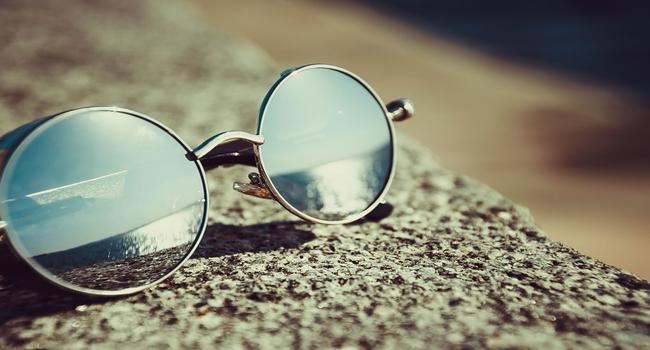
Tips on what to pack in your beach bag to keep your eyes safe
Most people remember to bring a pair of sunglasses to the shore. But unbelievably, only 31% of Americans actually wears those sunglasses, according to a recent report by The Vision Council. So, the first advice from us that if you own sunglasses, you need to wear them to reap the benefits. Putting your sunglasses in your bag (or perched on top of your head for a sleek look) won’t block dangerous UV rays from reaching your eyes!
You know sunglasses are important, but why?
In the short term, a day at the beach without shades can cause photokeratitis, similar to a red and painful sunburn of your eye. And in the long term, excessive exposure to the UV rays can seriously damage your vision, increasing your odds of developing diseases such as macular degeneration and cataracts. Bottom line for beach bums – wear your sunglasses over your eyes for ultimate protection!
Sunglasses features you need
Now that we’ve established why you need to block your eyes from UV light, what’s the best way to do it? According to our Richboro eye doctor, these are some of the most important criteria for choosing sunglasses:
- Complete UV protection – 100% blockage against both UVA and UVB rays. Look for sunglasses labeled “UV400” or “100% UV Protection.” Also, don’t be fooled by the darkness of the lenses, it has everything to do with style and nothing to do with protective strength.
- Wraparound designs – ideally, your frames should cover as much of the area surrounding your eyes as possible. That’s because sun rays can enter from the sides, bottom, and top too, and not just from straight ahead. Remember, harmful sunlight reflects off the ocean and white sand – and it can hit your face from any angle.
- Polarized lenses – polarized sunglasses can block out the strongest light rays, and they eliminate glare for more comfortable vision too.
- Prescription lenses – the perfect solution for anyone who normally needs glasses or contacts to see.
Match your eyewear to your sport
Riding the waves? Surf goggles are the latest craze for surfing, jet-skiing, bodysurfing, and all water sports – Dr. O'Daniel is a big fan of these protective specialty glasses! They will decrease your eyes’ contact with UV rays, reduce glare, and protect your delicate peepers against wind and water spray. Typically, the lenses are also anti-fog and impact-resistant. Wraparound styles are ideal, because they give you wide peripheral vision too. Surf goggles also enhance your underwater vision and reduce the risk of eye infection.
Ever hear of surfers’ eye? Officially termed pterygium, surfers’ eye results from prolonged exposure to the sun. It starts as a benign lesion that spreads across the white of your eye and can cause irritation and blurry vision. Sunglasses and surf goggles will protect against this unsightly condition!
Water sports aren’t the only way you can damage your eyes at the beach. When you play volleyball, beach soccer, or any other game on the sand, whizzing objects are a part of the fun. Sports goggles, which usually come with built-in UV protection, will keep your eyes safe from injury and the sun.
Planning to take a plunge? Goggles are a must for swimmers. The high salt concentration of ocean water can be irritating, and if the water is polluted with contaminants (sadly, this is common at many beaches) – then the risks to your vision are even greater.
Contact lenses and the beach are a bad combo
Contact lenses can trap nasty germs and harmful bacteria on the surface of your eye, where they can breed and lead to a serious eye infection. In fact, some of these eye infections can be so serious that they threaten your vision. Best practice is to remove your contact lenses before swimming and put on a pair of prescription swim goggles to see underwater.
If you simply refuse to listen to this advice from our office, and you insist on wearing contacts when you swim – then the second best thing to do is wear daily disposable lenses and throw them out as soon as you emerge from the water. Then you can insert in a fresh pair.
Don’t let an overcast day cloud your judgement
A cloudy sky doesn’t fully block the intense UV rays of the summer sun. So no matter the forecast, you still need to bring your sunglasses.
